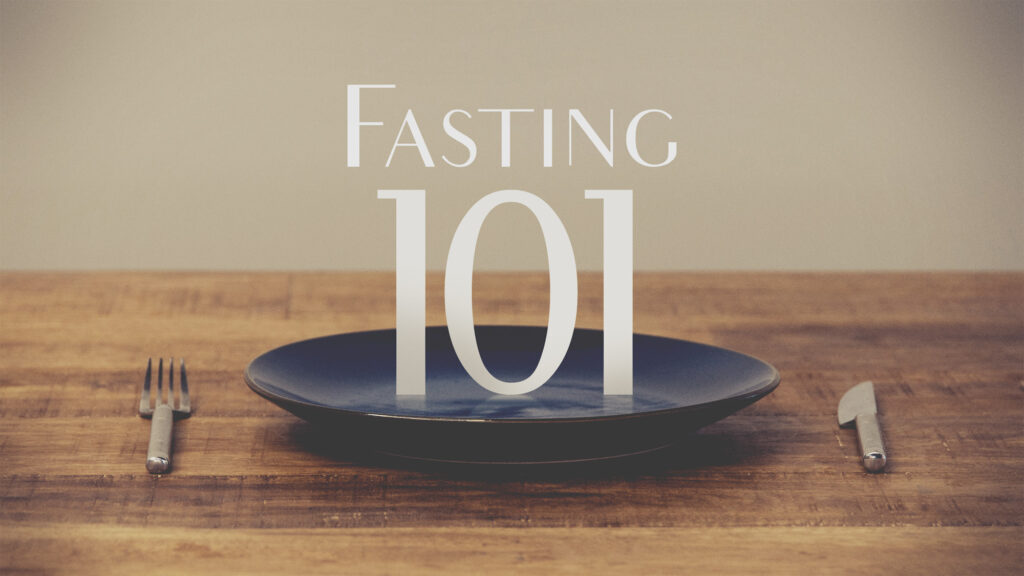
We encourage fasting for 21 days each year in the month of January. This is part of our 21 Days of Prayer and Fasting season.
You may also choose to fast at other times during the year for your own spiritual development. It’s very typical to fast a single meal, a whole day, or three days or more.
I haven’t heard much about fasting.
A recent survey Conducted by Barna Research found that only about 17% of American Christians participate in some form of fasting. Donald Whitney, a professor at The Southern Baptist Theological Seminary, said in a recent interview “Fasting appears in the Bible more often than something as important as baptism,” He goes on to say “by my count, Fasting shows up about 77 times or so, versus just 75 times for baptism.”
What is fasting?
Fasting is the spiritual discipline of denying our flesh something that it desires (typically food) so that we can feast on the things of God.
The word “fast” means
Tsom in the Hebrew meaning “not to eat.”
Nesteia in the Greek language. meaning “no food.”
Scriptures about fasting
Matthew 6:16-18New International Version (NIV)
16 When you fast, do not look somber as the hypocrites do, for they disfigure their faces to show others they are fasting. Truly I tell you, they have received their reward in full. 17 But when you fast, put oil on your head and wash your face, 18 so that it will not be obvious to others that you are fasting, but only to your Father, who is unseen; and your Father, who sees what is done in secret, will reward you.
Matthew 9:14-15 New International Version (NIV)
14 Then John’s disciples came and asked him, “How is it that we and the Pharisees fast often, but your disciples do not fast?”
15 Jesus answered, “How can the guests of the bridegroom mourn while he is with them? The time will come when the bridegroom will be taken from them; then they will fast.”
Luke 18:9-14 New International Version (NIV)
9 To some who were confident of their own righteousness and looked down on everyone else, Jesus told this parable: 10 “Two men went up to the temple to pray, one a Pharisee and the other a tax collector. 11 The Pharisee stood by himself and prayed: ‘God, I thank you that I am not like other people—robbers, evildoers, adulterers—or even like this tax collector. 12 I fast twice a week and give a tenth of all I get.’
13 “But the tax collector stood at a distance. He would not even look up to heaven, but beat his breast and said, ‘God, have mercy on me, a sinner.’
14 “I tell you that this man, rather than the other, went home justified before God. For all those who exalt themselves will be humbled, and those who humble themselves will be exalted.”
Nehemiah 9:1-3 New International Version (NIV)
1On the twenty-fourth day of the same month, the Israelites gathered together, fasting and wearing sackcloth and putting dust on their heads. 2 Those of Israelite descent had separated themselves from all foreigners. They stood in their places and confessed their sins and the sins of their ancestors. 3 They stood where they were and read from the Book of the Law of the Lord their God for a quarter of the day, and spent another quarter in confession and in worshiping the Lord their God.
Types of Fasts
#1 Selective Fast
This type of fast involves removing certain elements from your diet. One example of a selective fast is the Daniel Fast, during which you remove meat, sweets, and bread from your diet and consume water and juice for fluids and fruits and vegetables for food.
#2 Partial Fast
This fast is sometimes called the “Jewish Fast” and involves abstaining from eating any type of food in the morning and afternoon. This can either correlate to specific times of the day, such as 6:00 am to 3:00 pm, or from sunup to sundown.
#3 Complete Fast
In this type of fast, you drink only liquids, typically water with light juices as an option.
#4 Soul Fast
This fast is a great option if you do not have much experience fasting food, have health issues that prevent you from fasting food, or if you wish to refocus certain areas of your life that are out of balance.
For example, you might choose to stop using social media or watching television for the duration of the fast and then carefully bring that element back into your life in healthy doses at the conclusion of the fast.
Where Does Prayer Fit In?
Make sure to couple your fast with daily prayer!
Fasting without prayer is called a diet.
We fast to make space to seek the Lord with greater
urgency. When the hunger pains and withdrawals come,
we use them to remind ourselves… we are hungry for the
things of God.
Fasting Detaches us from this world
And prayer reattaches us with God
Fasting is NOT “earning” an answer to prayer. God
cannot be blackmailed by human actions.
Join us as we read the Bible in a year!
Choose the plan that best for you!
Option #1 – Read through the bible from Genesis to Revelation. Get the plan HERE
Option #2 (Most Popular) – Read through the bible by reading an old testament scripture, new testament scripture, a psalm , and a proverb. Get the plan HERE
Option #3 – Read through the bible Chronologically. Get the plan HERE
Edgewood Sermon About Fasting
